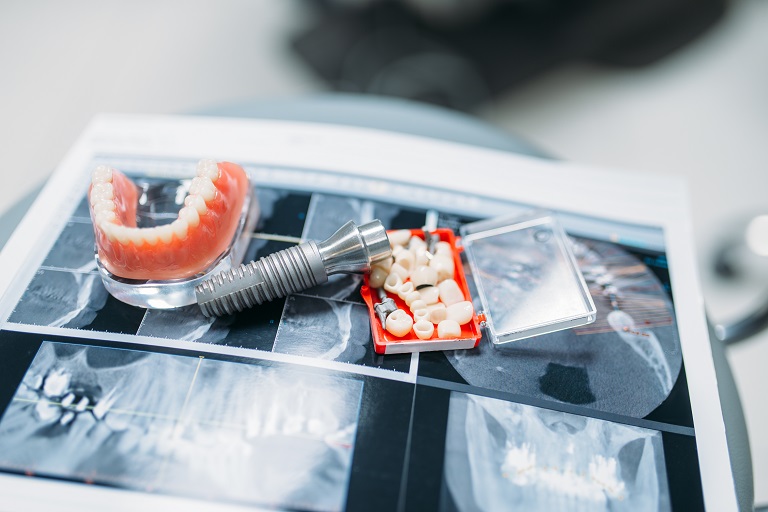Missing teeth are a common problem, affecting millions of Americans. Aside from aesthetic concerns, missing teeth can lead to difficulty chewing and eating, which can cause nutritional and digestive issues. Additionally, when gums are exposed, food and bacteria can become stuck. This can lead to infection and eventually gum disease, which has been linked to heart disease and diabetes. Furthermore, without teeth to support the jaw structure, facial structures may begin to look old and distorted, and it can even make it hard to speak.
Solutions Available
Fortunately, both dentures and dental implants are potential solutions to problems associated with missing teeth. Replacing lost teeth can significantly improve a patient’s quality of life and health. Dentures are removable prosthetic teeth replacements that come in either a full or partial set. This option is most popular for patients who are missing sets of teeth or all of their teeth, rather than single teeth here and there. Dentures must be secured with denture adhesive and can be removed throughout the day as needed.
There are three types of dentures: conventional, immediate, and overdenture. Conventional dentures are full, removable dentures that are placed in the mouth after any remaining teeth are removed, and tissues have healed. This process can take several months. Immediate dentures are inserted on the same day that the remaining teeth are removed. Overdentures are utilized to fill edentulous spaces in the event that some of the teeth can be saved. The partial or overdenture uses the remaining teeth as an anchor and rests on top of the soft tissues, like a traditional denture.
Dental implants, on the other hand, are permanent teeth replacements and have become a popular alternative to dentures. They are surgically placed within the jawbone, where they serve as the roots of missing teeth. The titanium in the implants fuses with the jawbone, mimicking natural bone. Dental implant-supported dentures preserve the jawbone and provide function almost to the same degree as natural dentition.
Dentures or Dental Implants?
Dental implants are an ideal solution for those who have one or more missing teeth, have a jawbone that has reached full growth, have adequate bone to secure the implants, have healthy oral tissues, and don’t have health conditions that will affect bone healing. The process to place dental implants takes several months and requires a commitment from the patient. However, dental implants last longer than dentures and are easier to maintain.
While dentures are less expensive than dental implants and can be removed at any time, they also have several cons. Dentures can slip out of place while eating or speaking if not properly secured. They can also cause bone resorption because teeth are not present to stimulate the jawbone, leading to bone decay and recession. Improperly fitted dentures can lead to infection or tooth decay and must be cleaned regularly or replaced if showing signs of significant wear. Finally, dentures do not provide full chewing function.
In comparison, dental implants are more expensive than dentures, but they last longer and save money over time. They are easier to maintain and do not have to be removed like dentures. However, there is a risk of possible damage to surrounding natural teeth or tissues during placement, and cleaning the gums around the implant can be difficult.
Whether you choose dentures or dental implants depends on your unique situation. Contact your oral surgeon to learn more and find out which solution is right for you. Addressing missing teeth is critical for overall health and well-being, and the right solution can help improve your quality of life.
